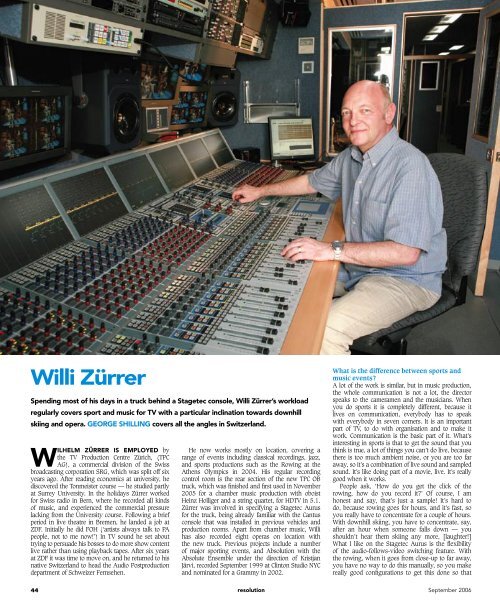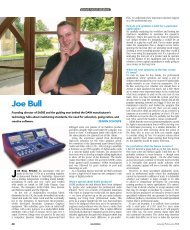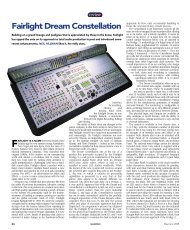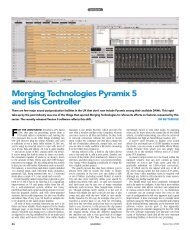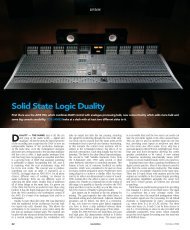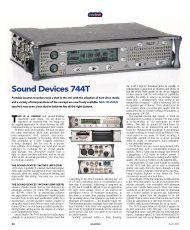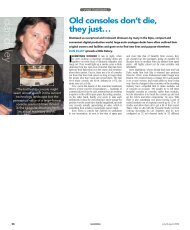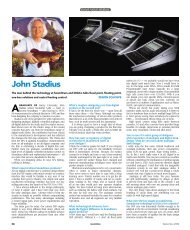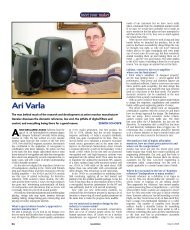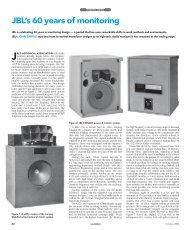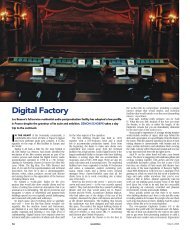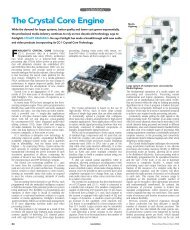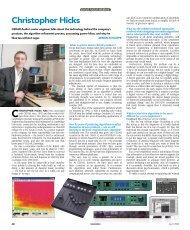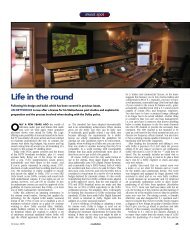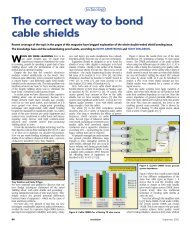Willi Zurrer - Resolution
Willi Zurrer - Resolution
Willi Zurrer - Resolution
You also want an ePaper? Increase the reach of your titles
YUMPU automatically turns print PDFs into web optimized ePapers that Google loves.
<strong>Willi</strong> Zürrer<br />
Spending most of his days in a truck behind a Stagetec console, <strong>Willi</strong> Zürrer’s workload<br />
regularly covers sport and music for TV with a particular inclination towards downhill<br />
skiing and opera. GEORGE SHILLING covers all the angles in Switzerland.<br />
WILHELM ZÜRRER IS EMPLOYED by<br />
the TV Production Centre Zürich, (TPC<br />
AG), a commercial division of the Swiss<br />
broadcasting corporation SRG, which was split off six<br />
years ago. After reading economics at university, he<br />
discovered the Tonmeister course — he studied partly<br />
at Surrey University. In the holidays Zürrer worked<br />
for Swiss radio in Bern, where he recorded all kinds<br />
of music, and experienced the commercial pressure<br />
lacking from the University course. Following a brief<br />
period in live theatre in Bremen, he landed a job at<br />
ZDF. Initially he did FOH (‘artists always talk to PA<br />
people, not to me now!’) In TV sound he set about<br />
trying to persuade his bosses to do more show content<br />
live rather than using playback tapes. After six years<br />
at ZDF it was time to move on, and he returned to his<br />
native Switzerland to head the Audio Postproduction<br />
department of Schweizer Fernsehen.<br />
He now works mostly on location, covering a<br />
range of events including classical recordings, jazz,<br />
and sports productions such as the Rowing at the<br />
Athens Olympics in 2004. His regular recording<br />
control room is the rear section of the new TPC OB<br />
truck, which was finished and first used in November<br />
2005 for a chamber music production with oboist<br />
Heinz Holliger and a string quartet, for HDTV in 5.1.<br />
Zürrer was involved in specifying a Stagetec Aurus<br />
for the truck, being already familiar with the Cantus<br />
console that was installed in previous vehicles and<br />
production rooms. Apart from chamber music, <strong>Willi</strong><br />
has also recorded eight operas on location with<br />
the new truck. Previous projects include a number<br />
of major sporting events, and Absolution with the<br />
Absolute Ensemble under the direction of Kristjan<br />
Järvi, recorded September 1999 at Clinton Studio NYC<br />
and nominated for a Grammy in 2002.<br />
What is the difference between sports and<br />
music events?<br />
A lot of the work is similar, but in music production,<br />
the whole communication is not a lot, the director<br />
speaks to the cameramen and the musicians. When<br />
you do sports it is completely different, because it<br />
lives on communication, everybody has to speak<br />
with everybody in seven corners. It is an important<br />
part of TV, to do with organisation and to make it<br />
work. Communication is the basic part of it. What’s<br />
interesting in sports is that to get the sound that you<br />
think is true, a lot of things you can’t do live, because<br />
there is too much ambient noise, or you are too far<br />
away, so it’s a combination of live sound and sampled<br />
sound. It’s like doing part of a movie, live. It’s really<br />
good when it works.<br />
People ask, ‘How do you get the click of the<br />
rowing, how do you record it?’ Of course, I am<br />
honest and say, that’s just a sample! It’s hard to<br />
do, because rowing goes for hours, and it’s fast, so<br />
you really have to concentrate for a couple of hours.<br />
With downhill skiing, you have to concentrate, say,<br />
after an hour when someone falls down — you<br />
shouldn’t hear them skiing any more, [laughter!]<br />
What I like on the Stagetec Aurus is the flexibility<br />
of the audio-follows-video switching feature. With<br />
the rowing, when it goes from close-up to far away,<br />
you have no way to do this manually, so you make<br />
really good configurations to get this done so that<br />
44 resolution September 2006
craft<br />
when it switches to the other camera you get the<br />
other sound. From what I hear, the Aurus — and<br />
the Cantus — have this flexibility which few other<br />
consoles have. You can have triggers, and make<br />
configurations with delays. There are so many other<br />
things to do that you will always be late, and the<br />
director doesn’t speak for audio.<br />
Do you do much work in 5.1?<br />
In music but not in sport. It is easier for, say,<br />
football, where there is a fixed location, but for<br />
things like downhill skiing you need much more<br />
mixed synthetic sound. For music, SRG has the<br />
transponder to transmit surround by satellite, also High<br />
Definition for the European Football in 2008. As soon<br />
as you have commentary, normally in Switzerland<br />
there are three languages, so where should it be<br />
mixed in surround? You need three control rooms,<br />
and then you have to record the international sound<br />
for later on. A lot of people haven’t really thought<br />
about the problems, the whole chain with all the<br />
different products that are needed. It is possible to<br />
do classical music live in surround, but the results<br />
I heard so far are mostly not very convincing.<br />
And you have to still concentrate on stereo and do a<br />
good stereo mix with some surround ambience. It’s<br />
different with multitrack recording, then you have the<br />
facilities and a quality control room to make a decent<br />
surround mix.<br />
How easy is it communicating with<br />
musicians or people on stage?<br />
I’m always happy when the truck isn’t too far away,<br />
I like to go inside and speak to them, it’s important to<br />
see each other. But you can’t always do it. Some video<br />
directors communicate with camera people but not<br />
with artists, so you also have to stay here and explain<br />
what’s going on, changing lights or whatever. Some<br />
studios have speakers in the ceiling, when you speak<br />
they look up — ‘his master’s voice’!<br />
Do you follow a musical score for classical<br />
productions?<br />
Yeah, I have to, to get to know what is right or wrong,<br />
to make the marks about good or bad things, and in<br />
a production like this it’s always important to speak<br />
to the musicians. I understand my job is this, to get<br />
their interpretation to here, on a new medium, not<br />
EMC216x125_EGlobe.psd<br />
live or in a concert hall, but at home, for DVD or on<br />
television, to understand their interpretation, not my<br />
fantasy world. My work is to speak to them about<br />
how to achieve this, because sometimes things have<br />
to be a bit different.<br />
In what way?<br />
When you play something live, for a different medium,<br />
sometimes things have to be a bit clearer, a musical<br />
line played differently. Maybe things I can’t do in<br />
a mix. Musicians have to help, but first I have to<br />
understand what they want, then I can say, maybe<br />
you should play this a bit louder or less...<br />
September 2006<br />
resolution<br />
45
craft<br />
How do you cope with people talking to you<br />
and distracting you?<br />
This is one of the major problems. Television lives a<br />
lot with communication, and audio is about listening<br />
so you always have conflict, and make priorities. For<br />
sport it’s really important to hear the producer and<br />
maybe other people, and also concentrate on your<br />
work. But doing music production, I just switch off<br />
everything else. During the production, if there is<br />
something really important, there is a talkback button<br />
for everybody. Doing music production means you<br />
have to be with the musicians and you can’t postpone<br />
things that don’t work, you can’t correct them, they<br />
have to be perfect in the moment you produce them.<br />
What is special about the Stagetec console?<br />
The connection to video makes the flexibility to<br />
work in TV production, and it offers a lot of flexible<br />
possibilities, just generally. The console philosophy<br />
is easy to understand. Perhaps this is not different to<br />
others, but it is very reliable. For productions, this is<br />
important.<br />
What is the recording format?<br />
In here we’ve got Pyramix, I’ve also got Tascam<br />
or the Mackie hard disk recorder, older formats,<br />
and I did quite a lot with Pro Tools, but in here for<br />
postproduction the Pyramix — it’s a very well-known<br />
product these days, a lot of people have it, and it’s<br />
also reliable. So far I work at 48kHz, 24-bit — it is<br />
important to have enough headroom and we don’t<br />
have to always work on the limit. I think 96kHz is<br />
nice to have, but the advantage isn’t really as much<br />
as having 24-bit.<br />
Do you run a backup system?<br />
In here I have started since High Definition VTRs<br />
have 12 tracks, so as the backup normally the VTRs<br />
provide enough tracks. If not, a second Pyramix<br />
or whatever. It is reliable, on the other hand they<br />
are expensive productions, it can’t be a problem if<br />
the recording doesn’t work because of a hard disk<br />
problem, for example.<br />
And how is the monitoring here with<br />
these Tannoys?<br />
Last year we did a small test, the Tannoy gives a<br />
good impression about the sound you are producing<br />
for home. It’s a loudspeaker that forces you to listen<br />
exactly to equalisation, that’s what I like.<br />
There are Genelecs for the vision team...<br />
Genelec doesn’t really force you to listen, that’s the<br />
difference, you have to force yourself — it very easily<br />
sounds nice on Genelec.<br />
Have you had to fix gear when kilometres<br />
from home?<br />
This is something that costs you nerves, doing<br />
outside broadcast means you don’t have a support<br />
department close to you. You have to be good at<br />
improvisation, and not have sleepless nights, when<br />
you think about all the things that can go wrong in<br />
this complex technology in here. But you know, when<br />
you are good at doing improvisations, you almost<br />
always find a way round. It happens that something<br />
breaks down and nothing works any more, this never<br />
happened to me during a recording or a broadcast, but<br />
it can happen! Normally you find a work around, and<br />
you have to be prepared for that.<br />
Is it a fibre link to the stage?<br />
Yes, I like it very much, it is much easier than<br />
analogue, but if this breaks down — it is the sort of<br />
risk you have to be aware of. You have to have an<br />
emergency setup so it would be at least possible to say<br />
‘Goodbye’ on the show!<br />
What is your audience mic setup?<br />
It depends, for a normal TV show, it depends where<br />
you can hang them, but just a couple of microphones,<br />
perhaps [Sennheiser] 416 cardioids or Neumann, I’m<br />
not really fixed on a particular model, I often use the<br />
Sennheiser MKH40 cardioid. It has to be a system<br />
that is workable, so it has to be where you can reach<br />
them or get to them, so my idea is to get a system<br />
where you have enough microphones so if you have<br />
a corner where someone is sleeping or laughing you<br />
can close it. But the more microphones you have, the<br />
more things you get you don’t want to hear, the more<br />
you destroy the original sound.<br />
Do you ever point them out from the stage?<br />
Yes, that’s more for rock or pop concerts, then you<br />
don’t have the delay from the PA. For classical there<br />
will be mics for surround. For TV there are some nice<br />
surround main microphones, but often you have the<br />
problem of just where to put them, so you have to<br />
have another idea, because a main microphone is in<br />
the centre of the orchestra, but you can’t put stands<br />
there because that’s the angle of the camera for the<br />
main shot. To hang it is not always possible, so you<br />
need of ideas to get a good sound but without this<br />
ugly thing in the middle that no-one wants to see.<br />
Do you EQ to multitrack?<br />
No, only just to get something off with a high-pass<br />
filter, but as little as possible, because everything I<br />
do, I can’t really reverse. It just goes straight to the<br />
Pyramix, I equalise it for the rough mix, and later on<br />
in production.<br />
What’s the key to good TV sound?<br />
To me, audio is to do with listening. Some people want<br />
to decide about audio by seeing something. Whatever<br />
equipment you have, the type of microphone you use,<br />
the most important thing is what you hear. Good sound<br />
always has something to do with listening, and in TV,<br />
sound has to fit the picture. But sometimes, we have<br />
to speak to the video director because there are things<br />
he can do to fit the picture to the sound, sometimes<br />
you really have to explain where the problem is.<br />
Sometimes they don’t understand the problem at first.<br />
Not everything is possible live — in movies, most of<br />
what you hear is done in postproduction...<br />
What project are you most proud of?<br />
Lately these operas, with 5.1 surround sound. I did a<br />
crossover-jazz music production in a church in France<br />
with Michel Godard, all live. This was demanding<br />
because it was live, because it was jazz, but with a lot<br />
of playback with medieval music mixed, and a lot of<br />
scenes in a church with ambiences. But the idea of the<br />
directors was that the people moved — this was very<br />
demanding to get it sorted so the concept worked. On<br />
the other side, the downhill skiing for the Olympics<br />
got a lot of good feedback from the Olympic broadcast<br />
organisation.<br />
What’s next?<br />
All the operas I recorded last month, there is<br />
postproduction ahead, these are all from the Zürich<br />
Opera House. In the autumn there are the big award<br />
shows, and there are already more operas planned,<br />
mostly for a company that produces DVDs. ■<br />
46 resolution September 2006


